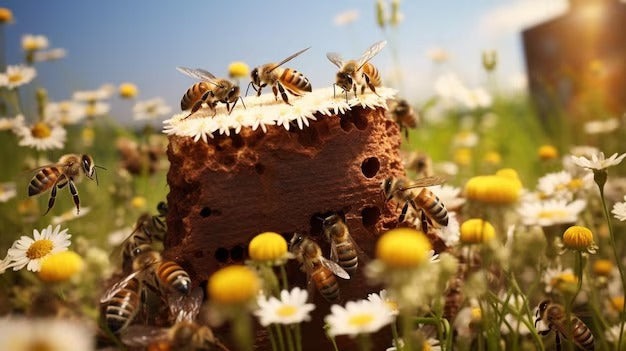
The Buzz on Beekeeping in Pakistan
Introduction:
Beekeeping, or apiculture, has a rich history in Pakistan, contributing not only to the agricultural landscape but also fostering economic opportunities and environmental sustainability. In this blog, we'll explore the fascinating world of beekeeping in Pakistan, shedding light on the practices, challenges, and the sweet rewards that come with this ancient art.
- The Diverse Geography of Beekeeping in Pakistan:
Pakistan's diverse geography, ranging from the mountainous regions in the north to the fertile plains in the south, provides an ideal environment for a variety of flora, making it a haven for bees. Different regions offer unique floral sources, influencing the flavour profiles of the honey produced.
- Beekeeping Traditions and Heritage:
Beekeeping in Pakistan has deep-rooted cultural significance, with traditional beekeepers passing down their knowledge through generations. The art of beekeeping is often intertwined with local customs and practices, creating a rich tapestry of heritage that adds depth to the profession.
-
Key Beekeeping Practices in Pakistan:
- Honeybee Species: Apis mellifera and Apis cerana are the primary honeybee species in Pakistan. Understanding their behaviour and characteristics is crucial for successful beekeeping.
- Floral Sources: Pakistan is home to a variety of flowering plants, each contributing to the distinct flavours of regional honeys. Prominent sources include Sidr, Acacia, and Eucalyptus trees.
- Harvesting Techniques: Beekeepers employ various harvesting techniques, balancing the extraction of honey with the preservation of bee colonies. Traditional and modern methods coexist, reflecting the diversity within the industry.
-
Challenges Faced by Beekeepers in Pakistan:
- Climate Variability: Unpredictable weather patterns can impact honey production and bee health.
- Pesticide Use: Agricultural practices sometimes involve the use of pesticides, posing a threat to bee colonies.
- Market Access: Beekeepers may face challenges in accessing markets for their honey, requiring support to reach a wider audience.
-
Innovations and Sustainable Practices:
- Modern Beekeeping Technology: The integration of modern technology, such as hive monitoring systems, is helping beekeepers optimize their operations.
- Training Programs: Initiatives offering training and support to beekeepers contribute to the adoption of sustainable practices.
-
Honeypot’s Role in Pakistani Beekeeping:
- Sustainable Partnerships: Highlight Honeypot’s commitment to sustainable beekeeping through partnerships with local beekeepers.
- Premium Honey Products: Showcase the quality and diversity of Honeypot’s honey products, emphasizing their unique flavours.
- The Future of Beekeeping in Pakistan:
Beekeeping in Pakistan is at a crossroads, with a growing awareness of its importance for biodiversity, agriculture, and livelihoods. The future holds promise as beekeepers, organizations, and enthusiasts work together to overcome challenges and nurture a thriving beekeeping industry.
Conclusion:
As we delve into the world of beekeeping in Pakistan, it becomes evident that beyond the buzzing hives lie stories of tradition, resilience, and the sweet rewards of a profession deeply rooted in the nation's heritage. With sustainable practices and continued support, beekeeping in Pakistan has the potential to not only thrive but also play a vital role in environmental conservation and economic development.